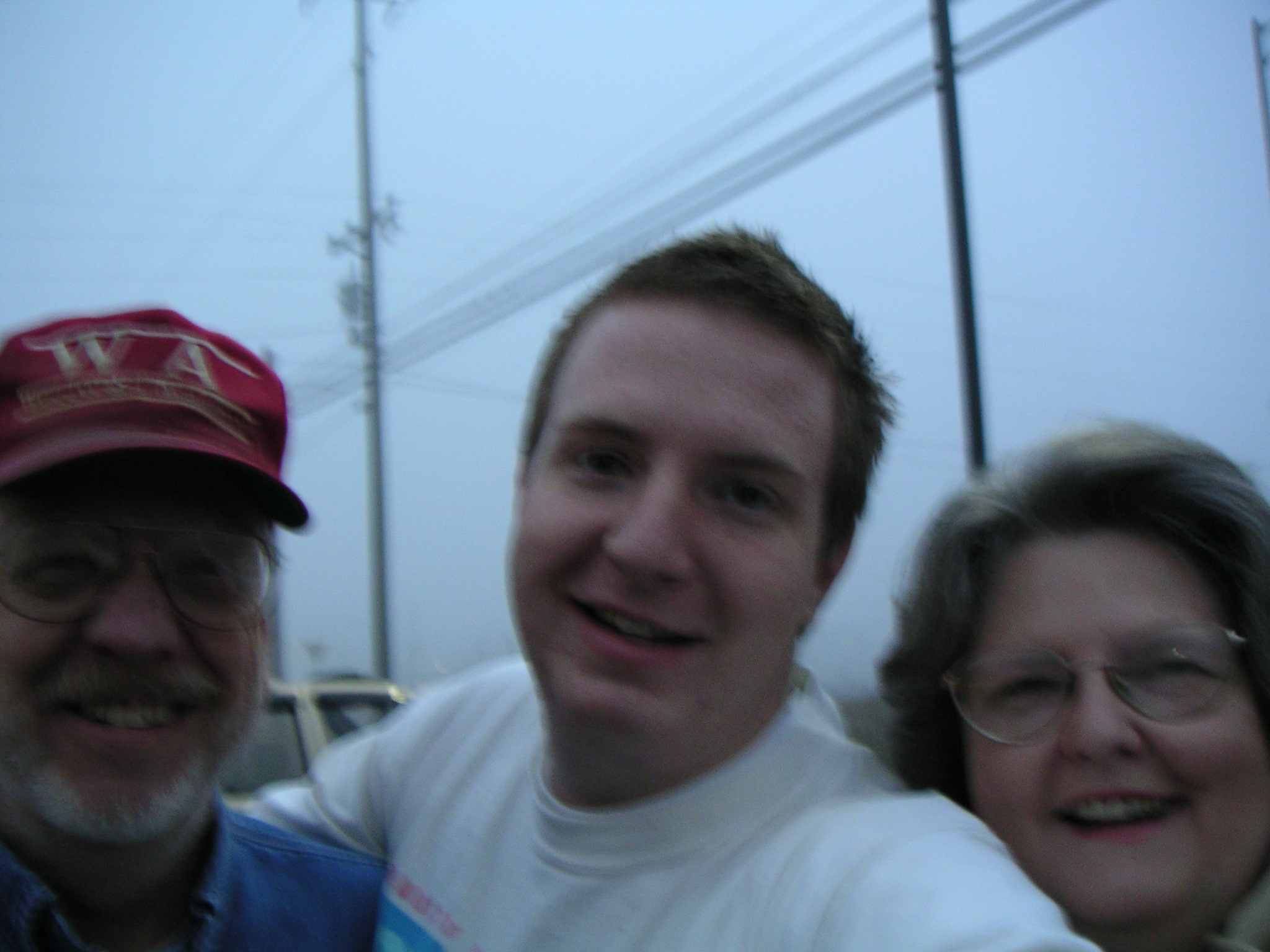I preached this sermon on June 22, 2014. Earlier in the month, after a couple of months of ongoing conversation, our church voted nearly unanimously (there was one abstention) to become Open and Affirming (ONA). ONA is an official, denominationally-sanctioned designation that proudly proclaims God’s welcome to all people, specifically including our LGBT sisters and brothers.
The scripture for the week was Matthew 10: 24 – 39. Read it here.
I had started another sermon and was nearly 2/3 of the way finished when the Spirit stirred and reminded me of another story I had to share…it’s included here.
This is a passage about division. It’s a scripture about what it means to follow Jesus, about speaking the truth. It’s about recognizing our value, about beginning to understand God’s love for us. It’s about following, about discipleship. It’s a story about us.
Before I tell you the story about us, I’m going to tell you a story about me. It’s a story I haven’t shared with you before because I didn’t want any of you to feel like I was pushing an agenda. I didn’t and don’t want any of you to feel manipulated.
Before I begin my story you need a little background. I come from a religious family. My immediate family wasn’t super-religious, but my extended family? Oooh, boy! My great-grandfather was a Southern Baptist minister for 50 years. My grandmother, his daughter, was a piano prodigy who played in nearly every church service he presided at from the age of 8. One of her daughters taught at the Southern Baptist Theological Seminary in Louisville, Kentucky. And that religiosity, while not an aggressive part of my faith formation, certainly influenced me. I remember early on baptizing my dogs with leaves in the backyard or (and don’t get any ideas, kids) spraying the live ficus tree in my bathroom with Lysol then lighting it with a match and pretending I was Moses and burning bush. It’s safe to say that religion added some…color to my world.
I always felt different. Not to get bogged down in stereotypes, but I was always artistic. I preferred violin lessons to sports, had an easier time connecting with the girls in my class than with other boys my age. But I didn’t know really how I was different or what made me different, just that I was. I didn’t know, that is, until a little thing called puberty hit. Ever heard that word from the pulpit? Cause you just did.
It’s no secret it’s a confusing time in one’s life. All sorts of emotions and hormones are raging. God bless our middle school teachers—I don’t know how they do it! It’s a challenge for anyone, but on top of those typical, day-to-day challenges came to realization of what made me different. While all the other boys were fawning over girls, I was fawning over them. Then one day, I over heard a classmate say, “eh, what a fag.” Not about me, but it was me and I knew it. That’s what I was and it wasn’t good. It wasn’t something you wanted to be. I prayed a lot. I mean, the Bible says that anything you pray in Jesus’ name will be granted to you. Well, I tried it. And it didn’t work. And I was beside myself. What was I going to do?
Fast-forward to the summer of 2000. I was fifteen and finally got up the courage to tell my mom. We in the car, driving out I-20 from Atlanta toward a town called Conyers, and I decided to test the waters. “Mom,” I began, “what do you think about gay people?” It wasn’t uncommon for me to ask such questions. I’m an only child and often asked about my parent’s beliefs in an effort to form my own. “Well,” she answered, “I think that’s the way they’re born and that God loves them as much as anyone.” “That’s good,” I replied pausing for a moment, hesitating just a little before I said, “because I am.” “Really?” “Yes.”
I don’t know how we stayed on the road, not because she would’ve driven off it in anger, but because she wanted to hold me. “Oh, I love you so much, even more now that you’ve told me.” She went on for a bit like that and admitted she was worried about my safety and my health, but over and over again, it was a message of love. We finally made it home and it came time to tell my dad. Now, my dad’s family was the religious one I described earlier so, simply put, I was scared to tell him. So, I did what any self-respecting teenager does when they don’t want to tell their father something—I made my mom do it.
I don’t know what she said to him, but I do know that he called up from the bottom of the steps, “Jono, can I come up?” “Sure.” I was lying on bed in tears watching Friends, which means I really must’ve been worried cause I can’t stand Friends. He came up, patted me on the shoulder and said, “It’s gonna be ok.” Then he left.
I’m not sure who he was comforting more, me or him, but those words, that simple phrase, of affirmation made all the difference.
Fast forward again, this time the last week of April. Yes, this April. I was sitting in my office here at the church when I got a phone call from my previous boss, the pastor of the United Methodist church I left to come here. “Hey Jon, how’re you doing?” “Oh good,” I remember telling him, “We’ve got so many good things happening.” “Well, that’s good. But I don’t think you’ll be doing so good when I tell you what I’ve got to tell you.” He proceeded to tell me how someone had gotten a hold of Greg and I’s save-the-dates, and had taken it to the district office and complained that David, my previous boss, was allowing a man in a same-sex relationship to do a wedding at this church. David was calling to tell me I couldn’t do the service. “I am so sorry, Jon. I’ve already called the family of the bride…I’ll do it for them if they need me to.”
I was at a loss. My ordination vows allow me to weddings, my church allows me to do weddings, I couldn’t believe that had just happened. Luckily for me, my partner, Greg, is an expert in United Methodist Church Law—and we got it taken care of.
Still, I find it so hard to believe that even now, even with my own congregation and church that welcomes me and loves me, I still have to face that kind of close-mindedness.
The Gospel Lesson today tells us not to fear, “for nothing is cover up that will not be uncovered, and nothing secret that will not become known. What I say to you in the dark, tell in the light; and what you hear whispered, proclaim from the housetops.”
Friends, this is why I’m proud to be your pastor. You heard the call of Christ to proclaim God’s love to everyone, everyone, everyone. The truth is, it’s long be the way you operate. When you voted to become Open and Affirming, you formalized that commitment. And I couldn’t be prouder. When we began the conversations about becoming Open and Affirming several of you asked me in groups or individually, “Why do we need to be ONA? We already welcome everybody.” The short answer is that you don’t put your welcome mat inside the front door. That is to say, we know who we are, but we should, as Christ reminds us today, “proclaim from the housetops what we hear whispered.” Here’s the slightly longer answer. The three largest denominations, the Roman Catholic Church, the United Methodist Church, and the Southern Baptist convention account for 101.9 million people. Each one of those religious organizations has an active policy of discrimination against people who are lesbian, gay, bisexual, or transgender. Each of those churches also says, “everyone is welcome.”
That is why it’s important for us to bring the truth of God’s extravagant welcome to light. And it’s a truth that is, for some reason, hard for some to accept. And it’s truths like this one—that in God’s house, everyone, everyone, everyone is welcome, that, believe it or not, can lead to discord, that can rip families apart. And that unsettling is why Jesus tells us, “Do not think that I have come to bring peace to the earth; I have not come to bring peace, but a sword.” Jesus isn’t endorsing weapons; rather, he’s being honest about the fact that this abundant love, this extravagant welcome will lead to division. He’s reminding us that following him is hard work, it’s challenging and exciting and hope-filled and long. But it’s the work we’ve been tasked with and it’s work worth doing.
Today, you’ll find a draft our ONA statement on the yellow sheet in your bulletin. We’ve spent hours poring over the words here, trying to express the extravagant welcome that has made it’s home at Westfield. It’s a welcome that acknowledges the pain of the world, the brokenness of the world, and that God calls us to something more—a genuine welcome. Read the statement and think about it. And offer some feedback. Mark the sheet up, toss it in the plate next week or drop it by the office. Help us bring to light that which God has told us.
Friends, this is our story—a story of learning to follow Jesus, a story of opening our arms wider to the people who look like we do and the people who don’t, to the people who love like we do and the ones who love differently, to the ones who share our faith and the ones whose faith is different. And we will continue to trust that the God who knows every sparrow in the sky and every hair on our heads knows us and holds us and beams at us when we together proclaim that everyone, everyone, everyone is welcome here. Thanks be to God. Amen.




I pray for the wecome
This posting is an answer from God. I am a member of a small Methodist Church in North Carolina. It is a blessing knowing that there are other gay members of faith out there. My partner is a choir member at our church and I am the chairman of the worship committee, altar design plus altar guild. I have had such mixed feelings about my position in the church but this helps to affirm my belief. God loves us all and we need to shout it from the roof top. I will continue to follow your story.
William! I’m glad you found my blog! My now husband, Greg, works for the Reconciling Ministries Network (the UM organization working toward LGBT inclusion in the church) as an organizer for your region. If you’d like to chat with him, email me at jon@westfielducc.org. I’ll be glad to pass your contact info along.